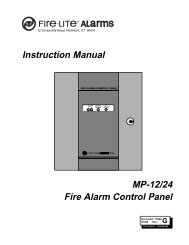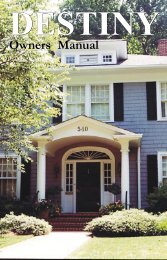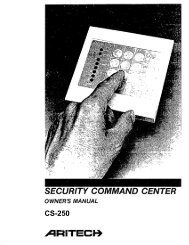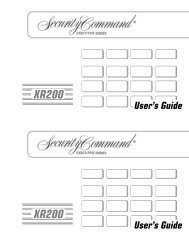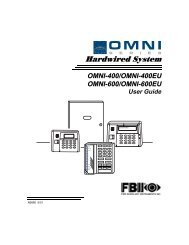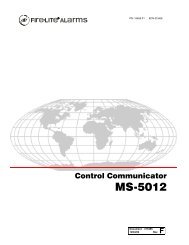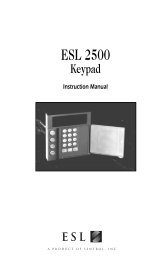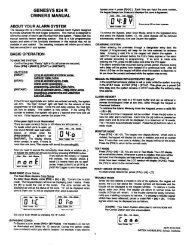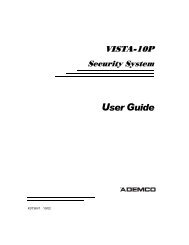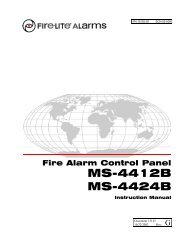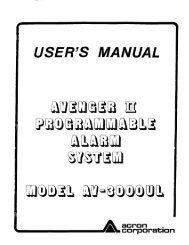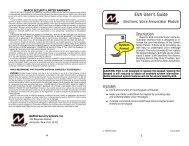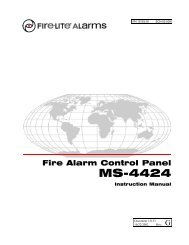Fire-Lite Alarms MS-9600 Addressable Fire Control Panel
Fire-Lite Alarms MS-9600 Addressable Fire Control Panel
Fire-Lite Alarms MS-9600 Addressable Fire Control Panel
- No tags were found...
You also want an ePaper? Increase the reach of your titles
YUMPU automatically turns print PDFs into web optimized ePapers that Google loves.
<strong>Fire</strong> Alarm System LimitationsAn automatic fire alarm system–typically made up of smokedetectors, heat detectors, manual pull stations, audible warningdevices, and a fire alarm control with remote notificationcapability–can provide early warning of a developing fire.Such a system, however, does not assure protection againstproperty damage or loss of life resulting from a fire.The Manufacturer recommends that smoke and/or heat detectorsbe located throughout a protected premise following therecommendations of the current edition of the National <strong>Fire</strong>Protection Association Standard 72 (NFPA 72),manufacturer's recommendations, State and local codes, andthe recommendations contained in the Guide for Proper Useof System Smoke Detectors, which is made available at nocharge to all installing dealers. A study by the Federal EmergencyManagement Agency (an agency of the United Statesgovernment) indicated that smoke detectors may not go off inas many as 35% of all fires. While fire alarm systems are designedto provide early warning against fire, they do not guaranteewarning or protection against fire. A fire alarm systemmay not provide timely or adequate warning, or simply may notfunction, for a variety of reasons:Smoke detectors may not sense fire where smoke cannotreach the detectors such as in chimneys, in or behind walls, onroofs, or on the other side of closed doors. Smoke detectorsalso may not sense a fire on another level or floor of a building.A second-floor detector, for example, may not sense afirst-floor or basement fire.Particles of combustion or "smoke" from a developing firemay not reach the sensing chambers of smoke detectors because:• Barriers such as closed or partially closed doors, walls, orchimneys may inhibit particle or smoke flow.• Smoke particles may become "cold," stratify, and not reachthe ceiling or upper walls where detectors are located.• Smoke particles may be blown away from detectors by airoutlets.• Smoke particles may be drawn into air returns beforereaching the detector.The amount of "smoke" present may be insufficient to alarmsmoke detectors. Smoke detectors are designed to alarm atvarious levels of smoke density. If such density levels are notcreated by a developing fire at the location of detectors, thedetectors will not go into alarm.Smoke detectors, even when working properly, have sensinglimitations. Detectors that have photoelectronic sensingchambers tend to detect smoldering fires better than flamingfires, which have little visible smoke. Detectors that have ionizing-typesensing chambers tend to detect fast-flaming firesbetter than smoldering fires. Because fires develop in differentways and are often unpredictable in their growth, neithertype of detector is necessarily best and a given type of detectormay not provide adequate warning of a fire.Smoke detectors cannot be expected to provide adequatewarning of fires caused by arson, children playing withmatches (especially in bedrooms), smoking in bed, and violentexplosions (caused by escaping gas, improper storage offlammable materials, etc.).While a fire alarm system may lower insurancerates, it is not a substitute for fire insurance!Heat detectors do not sense particles of combustion andalarm only when heat on their sensors increases at a predeterminedrate or reaches a predetermined level. Rate-of-riseheat detectors may be subject to reduced sensitivity over time.For this reason, the rate-of-rise feature of each detectorshould be tested at least once per year by a qualified fire protectionspecialist. Heat detectors are designed to protectproperty, not life.IMPORTANT! Smoke detectors must be installed in thesame room as the control panel and in rooms used by the systemfor the connection of alarm transmission wiring, communications,signaling, and/or power. If detectors are not so located,a developing fire may damage the alarm system, cripplingits ability to report a fire.Audible warning devices such as bells may not alert peopleif these devices are located on the other side of closed orpartly open doors or are located on another floor of a building.Any warning device may fail to alert people with a disability orthose who have recently consumed drugs, alcohol or medication.Please note that:• Strobes can, under certain circumstances, cause seizuresin people with conditions such as epilepsy.• Studies have shown that certain people, even when theyhear a fire alarm signal, do not respond or comprehend themeaning of the signal. It is the property owner's responsibilityto conduct fire drills and other training exercise to makepeople aware of fire alarm signals and instruct them on theproper reaction to alarm signals.• In rare instances, the sounding of a warning device cancause temporary or permanent hearing loss.A fire alarm system will not operate without any electricalpower. If AC power fails, the system will operate from standbybatteries only for a specified time and only if the batterieshave been properly maintained and replaced regularly.Equipment used in the system may not be technically compatiblewith the control. It is essential to use only equipmentlisted for service with your control panel.Telephone lines needed to transmit alarm signals from apremise to a central monitoring station may be out of serviceor temporarily disabled. For added protection against telephoneline failure, backup radio transmission systems are recommended.The most common cause of fire alarm malfunction is inadequatemaintenance. To keep the entire fire alarm system inexcellent working order, ongoing maintenance is required perthe manufacturer's recommendations, and UL and NFPA standards.At a minimum, the requirements of Chapter 7 of NFPA72 shall be followed. Environments with large amounts ofdust, dirt or high air velocity require more frequent maintenance.A maintenance agreement should be arrangedthrough the local manufacturer's representative. Maintenanceshould be scheduled monthly or as required by National and/or local fire codes and should be performed by authorized professionalfire alarm installers only. Adequate written recordsof all inspections should be kept.LimWarLg.p65 01/10/2000



